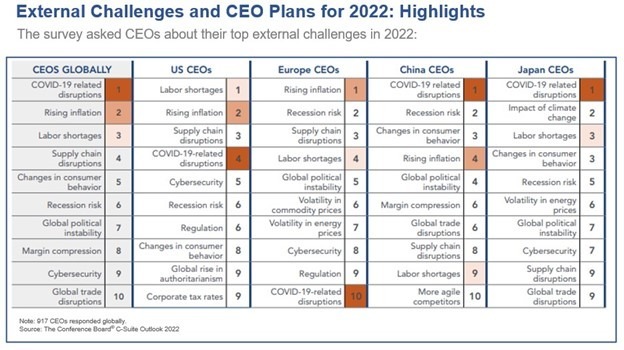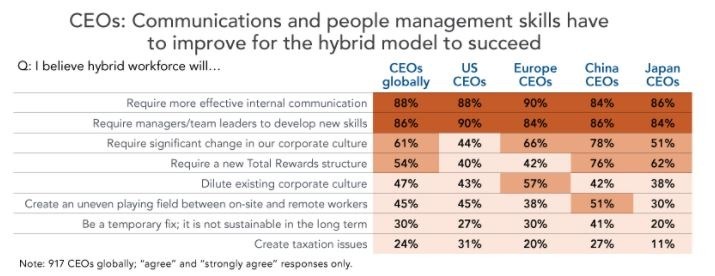Report: CEOs list their top business concerns for 2022
Find out what’s keeping the boss up at night—and how you should shift your priorities accordingly.

Top-notch communication pros know that one the best ways to remain indispensable is to alleviate your bosses’ biggest burdens.
But with all the chaos swirling around, what, exactly, is keeping CEOs up at night?
A new survey released by The Conference Board–featuring insights from about 900 CEOs and nearly 700 other C-suite executives–finds that labor shortages, inflation and ongoing “COVID-19 disruptions” top this year’s list of C-suite concerns. U.S.-based leaders, in particular, are also stressing about supply chain bottlenecks, cybersecurity and drastic “changes in consumer behavior.”
The most dramatic shift communicators should be mindful of is anxiety about rising prices. According to The Conference Board, inflation ranked 22nd on CEOs’ worry list from last year. This year, it’s No. 2. And 55% of execs expect inflation to last into 2023 or longer.
The survey also reveals a big change in how CEOs are feeling about remote work. A third of global CEOs anticipate counting on a “remote-heavy” workforce—even after the pandemic subsides. According to The Conference Board’s data, that’s nearly double the percentage of CEOs who said they had remote workforces in 2019. U.S.-based CEOs (53%) are the most likely to expect remote-heavy workforces moving forward. However, in order for hybrid or remote workplaces to succeed, 88% believe they’ll need “more effective internal communication.”
Let’s see what else is raising the hackles of top dogs:
1. Internal challenges become external nightmares.
Labor shortages are a top concern across the board. It’s especially a crunch in the U.S., where comms pros should gear up for another year dedicated to doing everything in their power to engage and retain top talent. Note, also, how high concerns about cybersecurity have become. Now would be a good time to get those crisis plans in place, eh?

2. It’s all about keeping workers on board.
Regardless of geography, industry or niche, 2022 is all about “attracting and retaining talent.” Doing so might require some changes, however.
According to Rebecca Ray, executive vice president of human capital at The Conference Board, leaders are increasingly seeing the need to forge a new culture that suits post-pandemic life and profoundly altered workplaces. She says:
“Sixty-one percent of CEOs globally believe a significant shift in corporate culture will be required for hybrid work to be successful. To develop and sustain a thriving corporate culture—an environment in which companies attract and retain talent—organizations must prioritize aligning employees to the company’s mission and purpose.”
How might you do that? Ray says:
“Ask for their help in building the future, encourage a ‘speak up’ culture, and develop empathetic managers who ensure that all employees, regardless of where or how they work, have opportunities for growth and impact. Companies can also offer, where possible, greater flexibility. At a time when not all staff are in the office, taking and communicating these steps can be all the more challenging, but absolutely critical to maintaining an inclusive culture that allows for productivity and engagement.”

3. Remote work is here to stay—and will be most common in the U. S.
The Conference Board finds that of the percentage of CEOs now planning to have remote-heavy workforces has doubled
- U.S. CEOs:
- Pre-pandemic, 2019: Just 28% of U.S. CEOs had 40% or more of their workers remote.
- 2022: Nearly double (53%) plan to have 40% or more remote—even after the pandemic subsides.
4. CEOs expect stronger productivity but weaker culture with the hybrid workplace.
As for the hybrid model’s impact on productivity and culture:
-
- U.S. CEOs: Thirty-eight percent expect productivity to increase; 23% expect it to decrease. Meanwhile, 51% say it will weaken culture, and 18% say it will strengthen culture.
Also of note: 88% of CEOs believe hybrid model success will require “more effective internal communication.”

5. ESG priorities focus on equality.
Economic opportunity and equality are the top-ranked ESG priorities of all CEOs worldwide, though U.S. CEOs are more likely to prioritize racial and gender equality in 2022.
U.S. execs are also more likely to face stakeholder pressure about the business’ role in society.

Paul Washington, executive director of The Conference Board’s ESG Center, offers a reminder that “sustainability” initiatives are about much more than PR or ticking a token philanthropy box. Demonstrating tangible, meaningful proof of your company’s ethical actions can be a huge competitive advantage moving forward. He says:
“CEOs across the globe need to have candid and ongoing discussions with their boards and C-suite colleagues about what these changes mean for their business strategy, operations, talent, and governance—not just to reduce risk, but to create and seize growth opportunities.”







